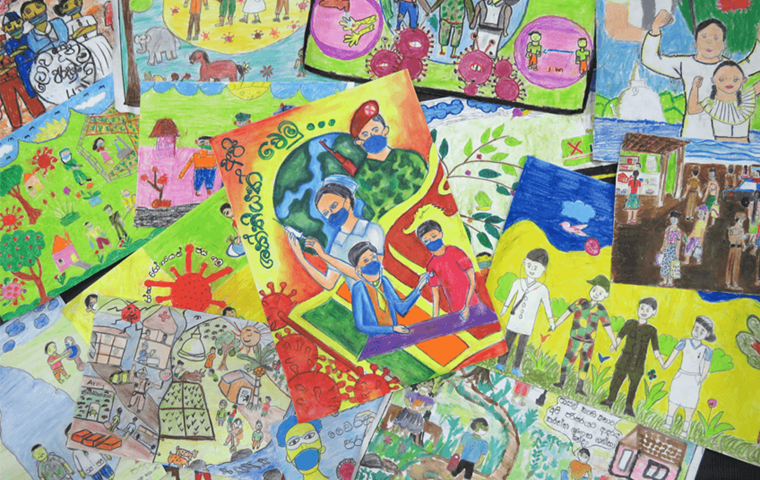by Fairtrade International
The COVID-19 crisis is a disaster for millions of children. On World Day against Child Labour, we highlight the risks to children’s wellbeing and four ways Fairtrade is responding.
The United Nations and child rights organisations are calling the COVID-19 pandemic a disaster for millions of children. School closures, coupled with limits on migrant labour, mean that boys and girls are more vulnerable to child labour. If parents become infected with the virus, children and youth, particularly girls, may end up assuming greater responsibilities for their family’s survival.
Economic downturn means more risk of child labour
But it’s not just the immediate impacts. Longer term, the economic downturn will drive even more people into poverty and, as a likely result, more children into child labour. Proposals have already been made to adjust the legal requirements for young workers (age 16 and above) to cope with labour shortages in the coffee sector. It is probable that other sectors and countries will follow, reversing hard-won gains. Weaker laws and stretched government budgets will result in more child labour, especially in rural and agricultural sectors.
Fairtrade is responding to these challenges in four key ways:
- Information and awareness-raising
Fairtrade’s producer networks are working closely with producer organisations to inform them of the link between child labour and COVID-19 and to heighten their awareness of the risks. Fairtrade’s COVID-19 guidance document for producers includes advice on protecting both children and vulnerable adults. In West Africa, Fairtrade certified co-operatives are making use of radio and local community information centres to sensitize communities to the increased risk of child labour and what constitutes hazardous work. In Sri Lanka and the Philippines, a children’s drawing competition provided two co-operatives the opportunity to engage with farming families and remind them of COVID-19 risks.Read Fairtrade’s COVID-19 guidance document for producers
- Funds to address short and long term needs
Fairtrade’s new Producer Relief Fund provides vital funding for Fairtrade producer organisations to invest in the safety and livelihoods of producers and their families, for example in temporary payment of wages for suspended workers, or emergency healthcare – reducing the risk of children having to work to support their families.
Producer organisations can also use the Fairtrade Premium more flexibly for immediate COVID-19 related needs. Food packages have been particularly vital for families where a school lunch was their child’s one meal of the day.
Looking forward, a new Fairtrade Producer Resilience Fund is intended to support longer-term economic interventions, including tailored programmes to address human rights risks in value chains.Find out more about Fairtrade’s new Producer Relief Fund
- Addressing the root causes: poverty, exploitation and discrimination
Child labour is driven by complex inter-related factors of poverty, exploitation and discrimination. It is no coincidence, for example, that an estimated 2 million children are in child labour in West Africa, where many cocoa farmers still earn less than $1.50 a day.
Fairtrade believes the best way to eliminate extreme poverty is to pay farmers and workers a fair price for their crops. We work to achieve decent incomes – for example by setting living income and living wage benchmarks, promoting collective bargaining agreements, and protecting farmers from market fluctuations via the Fairtrade Minimum Price. And the Fairtrade Standards prohibit all forms of violence and discrimination.
- Calling on governments to act to safeguard the vulnerable
Several Fairtrade producer organisations have taken steps to tackle child labour by implementing Fairtrade’s Youth Inclusive Monitoring and Remediation system, which has proven to be effective in empowering communities to identify cases of child labour and in heightening awareness of the risks (read more on youth driving change in sugar cane communities). But the current lack of support from governments or expert agencies means that many of these producer organisations now feel abandoned and powerless if they do find a suspected child labour case. They are urgently seeking solutions and calling upon their governments to support them.
Fairtrade is providing virtual guidance and contacting locally-based child rights NGOs for support to producers wherever possible. But Fairtrade cannot solve this alone. We cannot replace the role of governments in responding to and remediating cases of child labour, especially the worst forms of child labour.
Fairtrade calls on governments, companies and international bodies to invest more resources and provide safe ways to protect children trapped in child labour. If the Sustainable Development Goal of ending child labour by 2025 is not to turn into a pipe dream, we must all commit to working together to protect children and rebuilding a more sustainable, fair and inclusive economy in the wake of COVID-19. Millions of children and youth rely on us to act decisively now.
Notes
This article was amended on 16 June as follows:
A paragraph regarding lockdowns and the impact on child labour contained some inaccuracies and was removed.
The sentence regarding proposed changes to labour law for the coffee sector was amended. The minimum age for workers in Colombia is currently 15 years of age.
